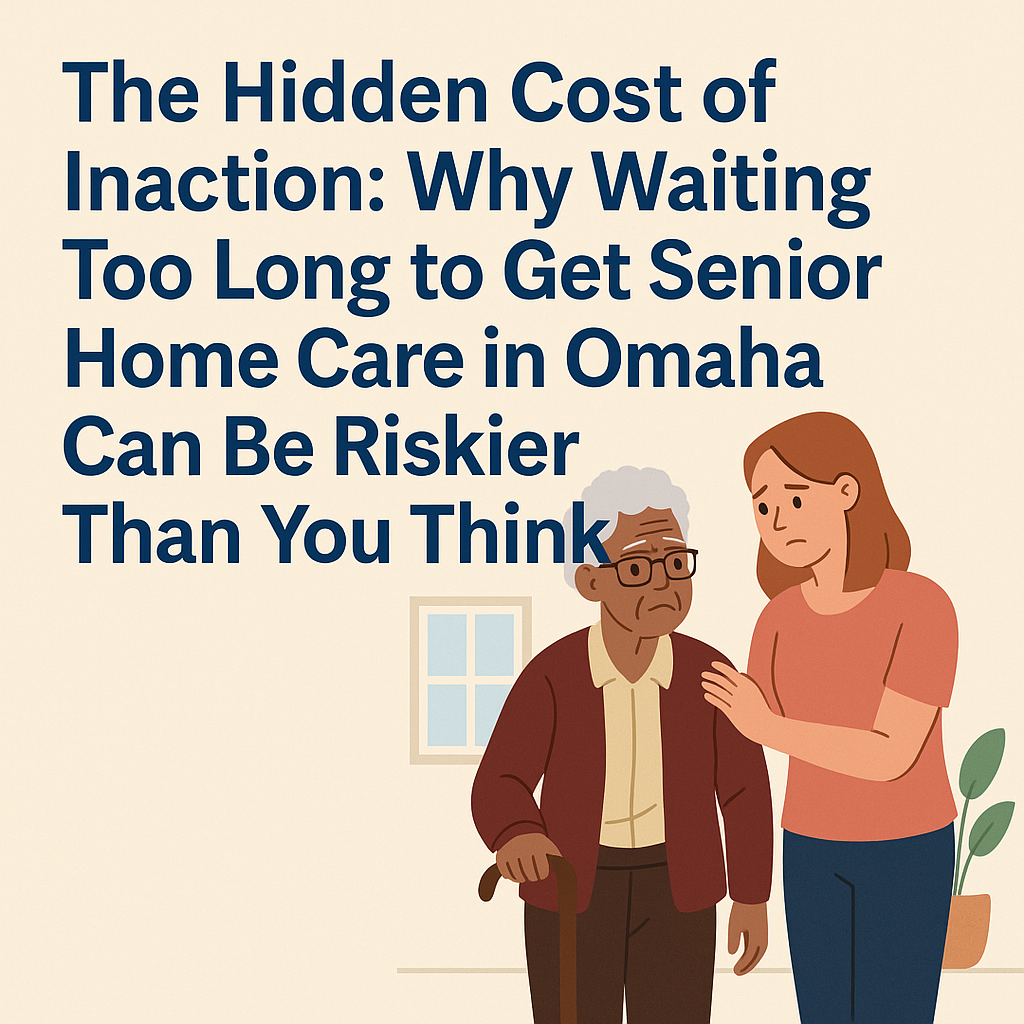
The Cost of Delaying Senior Home Care in Omaha – What Families Should Know
Share
The Hidden Cost of Inaction: Why Waiting Too Long to Get Senior Home Care in Omaha Can Be Riskier Than You Think
Introduction: A Silent Risk Many Omaha Families Face
Choosing home care for a loved one is never easy—but waiting too long can be even harder. Many families in Omaha delay this decision, hoping things will improve, or fearing the perceived cost and complexity of hiring help. Unfortunately, postponing care often comes at a much steeper price—both emotionally and financially.
At Xtrakare, we’ve seen time and again how families suffer unnecessary setbacks simply because they waited too long. In this post, we’ll unpack the hidden costs of delaying senior care in Omaha and how proactive steps today can protect your loved one tomorrow.
1. The Health Risks of “Waiting and Seeing”
It’s easy to write off small changes in an aging parent’s behavior—missed medications, weight loss, or forgetfulness—as "normal aging." But even minor signs often foreshadow something more serious.
Warning signs that require immediate attention:
-
Frequent falls or near-falls
-
Skipping meals or confusion about eating
-
Missed medications or overdoses
-
Isolation or depression
-
Memory lapses that put them at risk (leaving the stove on, wandering, etc.)
The problem? Waiting for a crisis often means waiting until after a fall, hospitalization, or emergency room visit—when it’s too late to plan carefully.
2. The Financial Cost of Delaying Care
Many families in Omaha hesitate to start home care due to cost concerns—but few realize that waiting actually costs more in the long run.
| Scenario | Cost If Addressed Early | Cost If Delayed |
|---|---|---|
| Fall Prevention | ~$300–$500/month for in-home help | $10,000+ for ER, surgery, rehab |
| Medication Reminders | $20/hour caregiver check-ins | $5,000+ for hospitalization due to mismanagement |
| Light Housekeeping/Meals | $25–$30/hour | $3,000/month assisted living or skilled nursing |
Tip: Starting with a few hours a week can prevent high-cost emergencies and allow the senior to remain safely at home longer.
3. Emotional Burnout for Family Caregivers
In Omaha, many adult children try to “do it all”—working full-time while caring for aging parents. But caregiver burnout is real, and delaying support often puts caregivers at risk of:
-
Depression or anxiety
-
Job loss or reduced hours
-
Marital stress or family tension
-
Declining personal health
A recent AARP study found that 60% of family caregivers experience depression or chronic stress—and it only gets worse when care demands escalate.
Getting help early can allow families to preserve their relationships, rather than letting caregiving strain them.
4. Limited Options After a Crisis
When a senior falls or is hospitalized suddenly, families scramble to arrange care within 24–72 hours. This leaves little time to research providers, tour facilities, or understand care plans.
By starting conversations before a crisis, Omaha families gain:
-
Time to interview home care agencies
-
The ability to choose between hourly or 24/7 care
-
Opportunity to explore Medicaid waiver or VA Aid & Attendance eligibility
-
Less stress and more confidence in decision-making
5. Delayed Care Often Means Less Independence
Contrary to popular belief, early home care preserves independence, rather than taking it away.
Seniors who receive light support (help with meals, hygiene, medication reminders) are more likely to:
-
Stay in their homes longer
-
Avoid assisted living or nursing homes
-
Maintain physical and cognitive health
-
Enjoy better quality of life
Waiting until total dependence sets in may eliminate home care as an option altogether.
Real Story: What Waiting Too Long Looks Like
Mrs. J, an 83-year-old widow in West Omaha, lived independently until she began forgetting to turn off her oven. Her daughter, concerned, considered hiring help—but thought it might insult her mother. Three months later, a grease fire caused minor burns and smoke inhalation. After a hospital stay, Mrs. J was discharged to a rehab facility—and ultimately moved into assisted living.
If they had brought in home care for just 2 hours a day to assist with meals, this chain of events could have been avoided—and Mrs. J might still be at home today.
How to Start Smart: A Low-Pressure Plan
Getting started doesn’t mean jumping into full-time care. At Xtrakare in Omaha, we help families ease into care with:
-
Free in-home assessments
-
Customized hourly care plans
-
Fall risk and medication safety checks
-
Flexible, no-obligation scheduling
Even 1–2 hours a day of help can make a significant difference—and buy time to plan for the future.
Final Thoughts: Don’t Wait for a Wake-Up Call
If you’ve been putting off senior home care for a parent or loved one in Omaha, you’re not alone—but the cost of inaction is real. Whether it’s a health emergency, caregiver burnout, or irreversible loss of independence, waiting too long often means losing the luxury of choice.
Instead of asking, “Can we wait a little longer?”—ask, “What might we gain by starting now?”
✅ Take the First Step Today
At Xtrakare, we offer free consultations for Omaha families ready to explore home care. We’ll walk through your loved one’s needs, create a customized care plan, and help you start with confidence—not fear.
📞 Call us today at 531-325-7170
📍 Serving Omaha and surrounding communities with compassion, care, and commitment.
